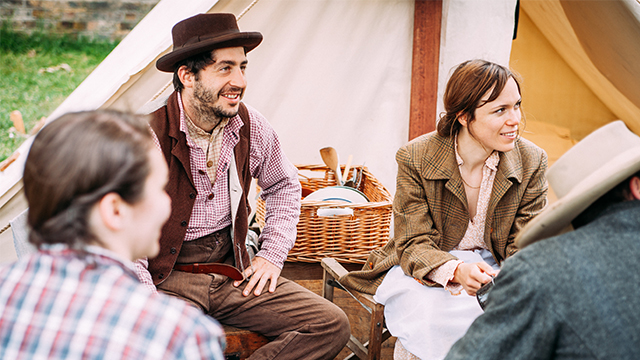How to Make Rehearsals A Warm and Welcoming Environment
Written by Ashleigh Gardner
September 14, 2018
We know that rehearsals can be an anxiety-filled process with dance combos, line-learning, difficult scene work, and so many other things that make the life of a performer a little more stressful. If you’re a director interested in making their rehearsals a little more warm and welcoming, review these top five ways you can make a difference in the lives of your fellow artists.
1. Bring snacks!

This is a given. Fed actors and techs are happy actors and techs. Plus, you get to have some snacks yourself. It’s a win-win situation.
2. Start each rehearsal with a “Circle Time”.

A lot of educational theatre camps and organizations use Circle Time as a way to get theatre learners to open up to their peers. (Sometimes teens and young adults are afraid of being vulnerable in front of others, and this serves as a get-to-know-me exercise.) Even though your theatre may be professional or adult community theatre, Circle Time is a great way to assess where every person stands that day emotionally and physically. (If someone is awaiting a call from the doctor or experienced the death of a loved one that morning, this may be important to know in case they need to take a break.). Usually, Circle Time starts with the person’s name, how they feel in that moment (words like “fine” and “tired” don’t count), and another shareable factoid about them that is personal to them (favorite album, favorite movie, favorite dessert, etc. Get creative!) Everyone in the cast/crew participates until every person has shared. Then rehearsal can begin.
3. For directors, include at least one positive note for each actor.

It’s so easy to repeatedly give corrective notes to a performer (because when we see something we don’t like, it stick out like a sore thumb). In addition to these critiques, find at least one positive note from that day’s rehearsal. Give each performer a positive “keep this!” or “that was amazing” or “I loved it when you did that thing with the box”. Ending critiques with a compliment isn’t just an important leadership strategy when it comes to actors; it’s applied in every field.
4. Discourage people getting down on themselves. Encourage positive thinking.

If someone makes a mistake and says something like, “Ugh, I’m so stupid,” or “I’m terrible at this,” stop them immediately and let them know they aren’t stupid. Everyone makes mistakes. This can be done by the director, stage managers, or fellow actors. Then, encourage them to move on with the task at hand. This shows that you’re confident in their abilities to move forward.
5. Be a positive leader.

There’s nothing more frightening than having a director who doesn’t believe that the play will be a success. To counter this, throughout the rehearsal process, point out positive aspects of the show so far, and keep a positive outlook on your show. Give actors and technicians updates about how far along the set, costumes, lighting, and sound design are. This helps other artists feel appreciated and informed. However, if there are areas that need some major TLC (lines, blocking, etc.), mention it individually to each performer and then offer them some words of encouragement.
6. End each rehearsal with goals for next rehearsal.

Sometimes it’s super easy to end rehearsal with notes and then get outta there. HOLD UP! Before you dismiss rehearsal, ask what each performer felt good about during this rehearsal and what their goal is for the next rehearsal. This helps close out the rehearsal on a positive and forward-thinking note.
Need some advice? We’ve got you covered.
- The Room Where It Happens: An Insider’s Guide to the College Audition
- How to Bow (And What Your Bow Says About You)
- 10 Basic Rules of Stage Combat (That Keep Everyone Safe)
- 5 Advantages of Learning Stage Combat
- Don’t Be a Diva: Common Pitfalls and How to Avoid Them
- 9 Articles of Clothing Every Thespian Should Keep In Their Wardrobe
- What Makes an Actor Website WOW?
- “Is my attitude not getting me roles?” And Other Essential Questions for Actors
- 6 Steps to Memorizing Shakespeare
- 10 Tricks to Staying Healthy All Season Long
- What Does It Take to Break Into Voiceovers?
- 5 Tips for Nailing Your College Music Theatre Audition
- 10 Tips on Owning the Room at Competition
- How to Balance Theatre and Coursework
- The 10 Secrets of Great Understudying
- 10 Items Every Actor Should Carry in Their Rehearsal Bag
- 10 Items Every Dancer Should Keep in Their Rehearsal Bag
